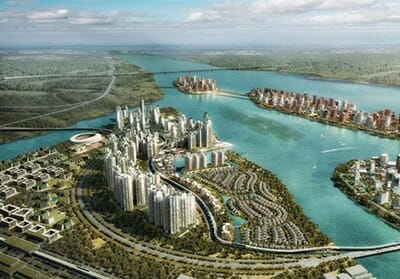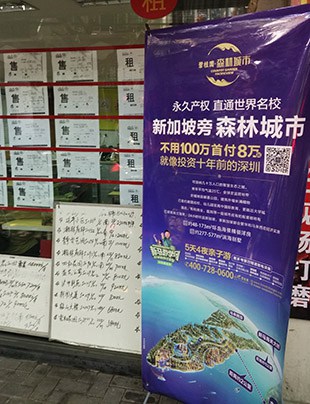
Forest City involves four reclaimed islands just 2 km from Singapore
China’s third largest developer has closed mainland sales offices for its largest overseas project as authorities in Beijing keep a tight grip on the country’s capital account.
Country Garden Holdings has shut the doors to sales offices in Shanghai and other Chinese cities for its 1400-hectare Forest City development in Malaysia’s Iskandar region. The Guangdong-based developer had been selling as much as 90 percent of the units at the project to clients from mainland China, before capital controls apparently struck the latest blow to the planned city next to Singapore.
A visit by Mingtiandi to a sales office in central Shanghai for the $100 billion project on Saturday found the doors locked and the showroom vacant of staff. A statement from Country Garden indicated that the sales offices were closed for renovation, and also noted that the closure was done “to better fit with current foreign exchange policies and regulations.” Showrooms in other Chinese cities were also said to be closed, and the company has not given a date for reopening the sales effort.
The shutdown comes as developers in other locations dependent on mainland sales have reported a rash of mainland buyers struggling to fulfill purchase contracts for overseas homes.
Building New Islands to House 700,000 People

Malaysian PM Najib (L) could offer Country Garden founder Yang Guoqiang (R) some tips on offshore money transfers
Country Garden, which has teamed with the sultanate of Johor State to begin reclaiming land for a set of four islands just 2 kilometres from Singapore, envisions Forest City as the future home of 700,000 people, and many of these potential inhabitants seem to have been from mainland China.
Malaysia-based Air Asia had set up direct flights from Guangzhou to Johor Bahru to ferry potential customers eager to look at tropical homes. At around RMB 20,000 per square metre, one-bedroom units were available for a modest (by mainland standards) rate of RMB 1 million. Chinese customers bussed in from Singapore, as well as buyers at showrooms in Shanghai and other major cities, had helped Country Garden to notch approximately RMB 18 billion ($2.61 billion) in sales at Forest City last year, with a report in the South China Morning Post quoting a company sales manager who said 90 percent of buyers came from mainland China.
Forest City had earlier been stalled by protests from both local fishermen and from the Singaporean government, with the project only recommencing in 2015 after Country Garden scaled back the original plan by 25 percent in scope.
Bringing the World to Iskandar

A Shanghai real estate agent offering Forest City homes last year
In response to the mainland setback Country Garden’s Malaysian subsidiary issued a statement on Friday indicating that the company would be promoting its Iskandar homes to buyers across Asia, as well as from the Middle East, Europe and the US.
Country Garden Pacificview Sdn Bhd said it has partnerships in place with property agencies globally, and “We also intend to set up sales galleries in Vietnam, Myanmar, Taiwan, Dubai and Japan in coming months.”
“We initially targeted buyers from mainland China because of our strong reputation in the market as we have successfully delivered 500 township projects in China as well as a residential project in Australia,” Country Garden Pacificview’s chief strategist Yu Runze said in a statement.
Forest City the Latest Victim of Capital Clampdown

Country Garden had been promoting Malaysia as an exotic destination for Chinese homebuyers
As challenging as it may be for Country Garden to push Malaysian homes to Japanese housewives, the alternative appears to be waiting for a major change of heart by some of the mainland’s top officials.
On Friday, China’s central bank governor Zhou Xiaochuan defended the crackdown on outbound capital at China’s annual legislative gathering.
“Some people [invested offshore] blindly and were in a rush to do so,” Zhou was quoted as saying in the Financial Times. “Some of this outbound investment was not in line with our own policies and had no real gain for China.” The central bank has been actively propping up the renminbi and the regime has been strictly enforcing rules on outbound money transfers in an effort to keep mainland investors from fleeing the Chinese currency.
The new level of controls include a rule put in place by China’s State Administration of Foreign Exchange on December 31st that requires applicants for foreign exchange to give a detailed account of how the funds will be used – and to pledge that the monies won’t be used to buy overseas real estate.
Capital Controls Felt in Sydney, Melbourne and Shanghai
Now, in addition to Country Garden’s Malaysia struggles, nearly 80 percent of Chinese buyers who bought Australian apartments off the plan are unable to settle on their purchase agreements, according to the head of a Beijing-based real estate agency specialising in Australian property, who was quoted in The Australian last week.
Besides Country Garden, a number of other Chinese developers have bet on projects in Iskandar, with Malaysian developments by Greenland Group and Guangzhou R&F also likely to be feeling the impact of China’s capital controls.
Leave a Reply